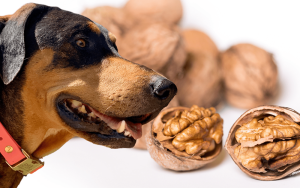Why Do Dogs Eat Grass? Unraveling the Mystery Behind This Common Canine Behavior

If you’re a dog owner, you’ve probably watched your furry friend munching on grass at least once. While it may seem odd, this behavior is actually quite common, and many dogs indulge in grass-eating from time to time. But what drives this peculiar behavior,
and is it something to worry about? In this article, we’ll explore the various reasons why dogs eat grass, whether it’s harmful, and when to be concerned. Let’s dive into the mystery behind why dogs eat grass and shed light on what might be going
on in your pet’s mind.
Understanding Canine Behavior: The Basics
Before we dive into the reasons why dogs eat grass, it’s important to understand a little bit about dog behavior in general. Dogs are naturally curious creatures. They explore their world through their senses, including taste and smell, and may sometimes
ingest things that seem unusual or out of the ordinary.
Most of the time, when dogs eat grass, it’s simply a part of their exploratory behavior. However, there are several other reasons that can explain why dogs choose to nibble on grass.
1. It’s Natural for Dogs to Eat Grass
One of the primary reasons dogs eat grass is simply because it’s instinctual. While domestic dogs are omnivores, their ancestors, wild canines, likely consumed plants in the wild as part of their diet. Wolves and other wild dogs may have eaten plant matter
as a supplement to their diet, or when they were scavenging for food. In fact, many species of animals, including wild canines, herbivores, and even cats, are known to eat plants from time to time.
Grass eating may also be linked to the way dogs’ digestive systems work. Dogs may instinctively know that grass can help them rid their stomachs of irritants or foreign substances. In the wild, dogs may have eaten grass to induce vomiting or help their
bodies purge something they shouldn’t have ingested.
2. Grass Can Induce Vomiting – A Natural Remedy?
One of the more well-known reasons dogs eat grass is to make themselves vomit. If your dog is feeling nauseous or has an upset stomach, they may turn to grass in an attempt to induce vomiting. The rough texture of the grass can irritate the lining of
the stomach, prompting your dog to vomit.
This behavior is thought to be instinctive. In the wild, vomiting may have helped canines expel toxins or something that didn’t agree with their digestive system. While this may sound alarming, it’s typically not something to worry about unless your dog
is vomiting frequently or showing signs of illness.
3. Boredom or Anxiety: A Coping Mechanism
Dogs are highly emotional creatures, and sometimes they eat grass because they are bored, anxious, or stressed. Just like humans may chew on their nails or tap their feet when nervous, dogs may turn to grass as a way to cope with anxiety or restlessness.
If your dog is eating grass out of boredom, it could be a sign that they need more physical and mental stimulation. Dogs who lack sufficient exercise, playtime, or mental challenges may resort to undesirable behaviors like grass eating as a way to pass
the time or relieve stress.
4. Nutritional Deficiency – Is Your Dog Lacking Something?
Another reason dogs might eat grass is to fulfill a nutritional deficiency. While dogs are primarily carnivores, they may still crave certain nutrients typically found in plants. Some researchers believe that grass-eating may be a way for dogs to supplement
their diet with fiber or other nutrients like folic acid, which helps with red blood cell production.
If you’ve noticed your dog eating large amounts of grass or other plants, it may be a good idea to assess their diet and make sure they are receiving all the nutrients they need. Poor nutrition can sometimes manifest in unusual behaviors like grass eating,
so ensure that your dog’s food is balanced and appropriate for their age, size, and health condition.
5. Grass May Taste Good to Some Dogs
Sometimes, dogs eat grass simply because they enjoy the taste or texture. Not all dogs will eat grass for the same reasons, and some might simply find it tasty or satisfying. If your dog doesn’t seem to show signs of illness after eating grass, and it’s
a sporadic behavior, it may just be a matter of preference. Some dogs may even have a favorite type of grass or plant they tend to eat when outdoors.
6. It Could Be a Gut Health Thing
There is a theory that grass eating is linked to gut health. Just like humans sometimes crave foods that help with digestion (like ginger or mint), dogs may eat grass because it helps soothe their stomachs. Grass contains fiber, which can aid in digestion
and help with gastrointestinal issues like constipation.
This theory supports the idea that grass is a natural remedy for an upset stomach. The fiber in grass could help push through undigested food or soothe any digestive discomfort. However, if your dog frequently experiences stomach problems, it’s important
to address this with a veterinarian rather than relying solely on grass consumption.
7. Is Grass-Eating Harmful? When Should You Be Concerned?
For most dogs, eating grass is harmless and is simply a natural behavior. However, there are certain circumstances where grass eating can be a cause for concern.
-
Toxic Plants: Not all grass is safe for dogs to eat. Some plants and grasses may be toxic to dogs, leading to symptoms like vomiting, diarrhea, or more severe health problems. Be mindful of where your dog is grazing, and ensure
they’re not consuming potentially harmful plants. -
Frequent Vomiting: If your dog eats grass regularly to induce vomiting, it could indicate a more serious underlying issue. Frequent vomiting could be a sign of gastrointestinal problems, infections, or even food allergies. If
your dog is vomiting often, it’s time to consult with a veterinarian. -
Changes in Behavior or Appetite: If your dog’s grass-eating habit is accompanied by changes in appetite, weight loss, or lethargy, it could point to a nutritional deficiency, illness, or other health issues. It’s always a good
idea to get a professional opinion if you notice these signs.
8. How to Address Grass-Eating in Dogs
If you’re concerned about your dog’s grass-eating behavior, there are a few things you can do to manage it:
-
Increase Exercise and Mental Stimulation: If boredom or anxiety is the root cause, providing more physical and mental stimulation can help curb the behavior. Regular walks, playtime, and interactive toys can help keep your dog
occupied and reduce stress. -
Monitor Diet: Ensure your dog is on a balanced diet with the right amount of nutrients. If you suspect a nutritional deficiency, consult your vet about dietary adjustments or supplements.
-
Avoid Toxic Plants: Be aware of the plants and grasses in your yard or during walks. Some plants are toxic to dogs, so make sure to keep your dog away from potentially dangerous vegetation.
-
Veterinary Checkup: If the behavior is frequent or accompanied by other concerning signs, it’s always a good idea to consult your veterinarian. They can help determine if there’s an underlying health issue causing the behavior.
Conclusion
In most cases, dogs eating grass is a completely normal and harmless behavior. Whether it’s to induce vomiting, satisfy a nutritional craving, or simply because it tastes good, grass-eating is just one of the many quirky behaviors that dogs exhibit. However,
if the behavior becomes frequent or is accompanied by other signs of illness, it’s always wise to consult a veterinarian to rule out any potential health problems. By understanding the reasons behind grass-eating, you can ensure your dog stays happy,
healthy, and well-cared for.






